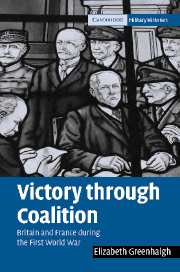Book contents
- Frontmatter
- Contents
- List of illustrations
- List of maps
- List of tables
- Preface
- List of frequently used abbreviations
- 1 Coalition warfare and the Franco-British alliance
- 2 Command, 1914–1915
- 3 The Battle of the Somme, 1916
- 4 Liaison, 1914–1916
- 5 The Allied response to the German submarine
- 6 Command, 1917
- 7 The creation of the Supreme War Council
- 8 The German offensives of 1918 and the crisis in command
- 9 The Allies counter-attack
- 10 Politics and bureaucracy of supply
- 11 Coalition as a defective mechanism?
- Bibliographical essay
- Index
1 - Coalition warfare and the Franco-British alliance
Published online by Cambridge University Press: 27 July 2009
- Frontmatter
- Contents
- List of illustrations
- List of maps
- List of tables
- Preface
- List of frequently used abbreviations
- 1 Coalition warfare and the Franco-British alliance
- 2 Command, 1914–1915
- 3 The Battle of the Somme, 1916
- 4 Liaison, 1914–1916
- 5 The Allied response to the German submarine
- 6 Command, 1917
- 7 The creation of the Supreme War Council
- 8 The German offensives of 1918 and the crisis in command
- 9 The Allies counter-attack
- 10 Politics and bureaucracy of supply
- 11 Coalition as a defective mechanism?
- Bibliographical essay
- Index
Summary
Britain and France had no history of cooperation, yet the Entente they had created in 1904 proceeded by trial and error, via recriminations, to win a war of unprecedented scale and reach. In the vast and growing literature of the Great War this victory through coalition has not received the attention it deserves, mainly because so many scholars view the war from various national perspectives.
The two countries overcame the multifarious problems of coalition warfare because fighting a war of survival made patent the necessity to overcome the centuries of mutual antagonism complicating an already complex alliance relationship. They put in place mechanisms to overcome those obstacles and complications, deriving from differing language, customs and organisation. This book examines the huge problems that the war created between 1914 and 1918 and the solutions that were proposed, fought over and finally agreed. It demonstrates that victory was achieved because of, not in spite of, coalition.
Problems with coalitions
As Baron Jomini put it in 1836, ‘Of course, in a war an ally is to be desired, all other things being equal.’ This ironic maxim underlines the fact that allies are valued only in proportion to the scale of the external threat. Thus the unlikely Franco-British coalition of 1914–18 survived over four years of war because the Allies feared that a victory by the Central Powers dominated by Prussian militarism would constitute an overwhelming threat to their great power status and their evolving democratic institutions (something that France and Britain did have in common).
- Type
- Chapter
- Information
- Victory through CoalitionBritain and France during the First World War, pp. 1 - 11Publisher: Cambridge University PressPrint publication year: 2005

